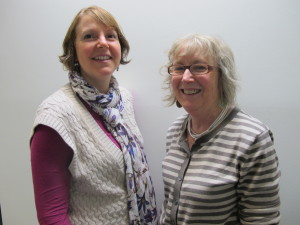Research event explores issues around migration and refugees

Dr Lisa Thomson and Jenni Blencowe from AMES Australia
Migration plays a critical role in Australia’s present and future economic wellbeing and will boost Australia’s GDP per capita by 5.9 per cent by 2050.
The settlement of migrants and refugees can have economic and social benefits for Australia as a nation as well as for individual communities.
The spouses of skilled migrants are an under-utilised resource who could be making a larger economic contribution.
These are some of the findings from a unique event looking at the latest research, views and commentary on current issues affecting refugee and new arrival settlement in Australia held in Canberra this week.
Titled ‘Skills, Settlement and Social Cohesion: Getting the most from Australia’s migration and refugee initiatives’, the event was staged by AMES Australia and the Migration Council of Australia to contribute to the knowledge of the increased movement (forced and voluntary) of people at the global, regional, national and local levels and to consider the implications for Australia.
Migration Council of Australia policy analyst Henry Sherrell told the forum recent research showed the clear economic benefits of migration.
“Our research refutes the idea that migration reduces then capacity of Australians to find work. The reality is that migration plays a role in addressing inequality and in generating opportunities for lower income workers,” Mr Sherrell said.
“The impact of migration is highly positive. It brings an improved employment to population ratio, drives higher consumption while migrants draw less on government services and contribute a net fiscal benefit through taxes paid,” he said.
Mr Sherrell said that there was no evidence anywhere in the world showing migration having a negative impact on employment. “Our current migration programme will add 14 million people to the population by 2050, and without it our GDP per capita would be 6% lower,” Mr Sherrell said.
The forum heard how an economic impact study into the resettlement of Karen-Burmese refugees at Nhill, in western Victoria, had added seventy jobs and more than $40 million to the local economy.
AMES Australia researcher Jenni Blencowe said that since early 2010 about 170 Karen refugees from Burma had been resettled at Nhill, initially to take up jobs at local poultry producer Luv-a-Duck.
“The study into the economic and social impact of the resettlement has found the program produced significant economic and social benefits,” Ms Blencowe said.
“The Karen people are emblematic of what is happening with displaced populations globally. And they also show what can be achieved when you work to people’s strengths and work with a welcoming local host community,” she said.
In opening the event, Swinburne University historian Professor Klaus Neumann, told the forum the debate around forced migration would benefit from global and historical perspectives.
“In 1949, in the aftermath of World War II, Australia accepted 75,000 displaced persons at a time of housing shortages and without the affluence we have now. In 2013, at the height of boat arrivals we accepted just 20,000 displaced persons.” said Professor Neumann, the author of ‘Across the Seas; Australia’s response to refugees’.
Professor Neumann said a problem with Australia’s response to refugee and asylum seeker policy was how it was being discussed publicly.
“It is uninformed and parochial with a focus almost exclusively on Australia and what is happening now. History is considered irrelevant,” Prof. Neumann said.
He said there was no obvious short or medium term solution.
“It’s a messy issue. It’s incredibly complicated and frighteningly large,” Prof. Neumann said.
But he said a regional quote system – such as the one currently being discussed among European nations – that took into account the capacities of various Asia-pacific nations to take in displaced persons might be a long term solution.
AMES Australia researcher Dr Lisa Thomson presented research that showed the considerable skills possessed the spouses of skilled migrants were going to waste.
“What we have here is a lost opportunity because most of the partners of skilled migrants who come to this country are themselves highly skilled. These people, mostly women, could be making contributions to the economy and utilising their skills,” Dr Thomson said.
AMES Australia CEO, Cath Scarth said she hoped the event and other similar forums would inform debate on migration.
“We are hoping that our discussions today will help us set up a framework for a productive debate around Australia’s response to migrants, refugees and asylum seekers and create a discussion within the settlement sector about the benefits and challenges of all forms of migration both for Australia and internationally,” she said.
Laurie Nowell
AMES Australia Senior Journalist












